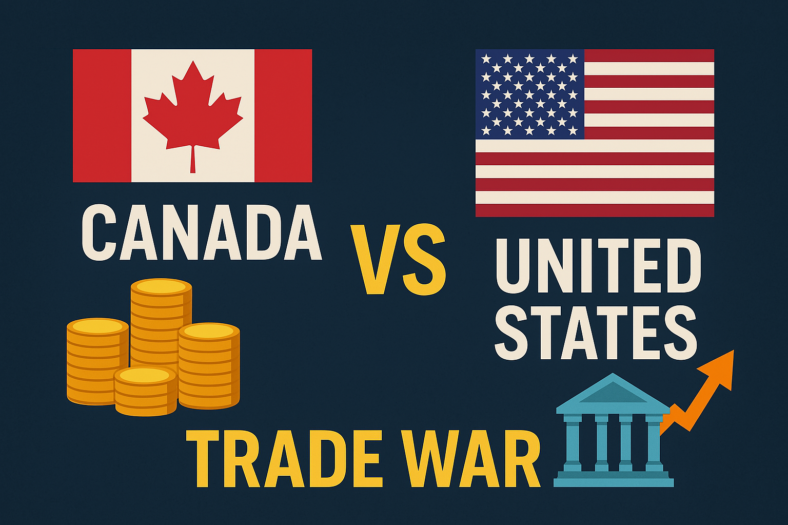The best online stock brokerages in Canada
| Questrade | $0-$4.95/trade | Commission-Free ETFs, Low Fees | Visit Website |
| Wealthsimple Trade | $0/trade | Commission-Free Trading, No Account Fees | Visit Website |
| RBC Direct Investing | $9.95/trade | Comprehensive Research Tools, High-Quality Support | Visit Website |
| TD Direct Investing | $9.99/trade | Powerful Trading Platforms, Robust Research | Visit Website |
| BMO InvestorLine | $9.95/trade | Advanced Trading Tools, Research Reports | Visit Website |
The Best Online Stock Brokers in Canada
Investing in the stock market is easier than ever with online stock brokers. Whether you are a beginner or an experienced investor, choosing the right broker is crucial for success. In this guide, we will cover the top five online stock brokers in Canada. Click on the links below to learn more about each provider:
1. Questrade
Features and Details of Questrade
Questrade is one of the most popular online brokers in Canada, offering a wide range of investment options including stocks, ETFs, options, and more. It is known for its low fees and advanced trading tools that cater to both beginner and experienced investors.
Fees
Questrade has a competitive fee structure, with stock trades costing $4.95 to $9.95 per trade. ETF purchases are free, and options trades start at $9.95 plus $1 per contract.
Service Offered
- Stock trading
- ETF trading (no commissions on purchases)
- Options, mutual funds, and bonds
- Registered accounts: RRSP, TFSA, RESP
USP
Questrade stands out for its free ETF purchases and the ability to trade U.S. stocks, making it ideal for investors looking to diversify internationally without paying high fees.
Pros and Cons
| ✔ Low trading fees | ✖ High fees for options trading |
| ✔ Free ETF purchases | ✖ Platform can be complex for beginners |
| ✔ Wide variety of account types | ✖ Inactivity fees for accounts under $5,000 |
| ✔ Access to U.S. stocks | |
| ✔ Advanced research tools |
Google Reviews
Questrade has a 4.2-star rating on Google, with users praising its low fees and robust trading tools, but some mention the platform can be intimidating for new investors.
2. Wealthsimple Trade
Features and Details of Wealthsimple Trade
Wealthsimple Trade is the first fully commission-free trading platform in Canada. It offers a simple, mobile-first experience ideal for new investors or those who want to make small trades without paying any commissions.
Fees
Wealthsimple Trade has no commission fees for trading stocks or ETFs. However, there is a 1.5% currency conversion fee on U.S. dollar transactions.
Service Offered
- Commission-free stock and ETF trading
- Registered accounts: TFSA, RRSP
- Mobile app for easy trading on the go
USP
Wealthsimple Trade’s unique selling proposition is its commission-free trading, which makes it a top choice for investors looking to avoid high fees, especially for small or frequent trades.
Pros and Cons
| ✔ Commission-free stock and ETF trading | ✖ No advanced trading tools |
| ✔ Easy-to-use mobile app | ✖ Limited account types |
| ✔ No minimum balance requirements | ✖ Currency conversion fees on U.S. trades |
| ✔ Ideal for beginners | |
| ✔ Fast account setup |
Google Reviews
Wealthsimple Trade has a 4.4-star rating on Google, with users praising its commission-free structure and ease of use, though some complain about the lack of advanced features for more experienced traders.
3. TD Direct Investing
Features and Details of TD Direct Investing
TD Direct Investing is part of TD Bank, one of Canada’s largest financial institutions. It offers a wide range of investment products, and its platform is robust with extensive research tools, making it suitable for both casual and professional traders.
Fees
TD Direct Investing charges $9.99 per trade for stocks and ETFs. Options trades cost $7 plus $1.25 per contract. There are no fees for account transfers to other institutions.
Service Offered
- Stock and ETF trading
- Mutual funds, bonds, and GICs
- Options and futures trading
- Registered accounts: RRSP, TFSA, RESP
USP
TD Direct Investing offers a wide range of investment products and a comprehensive platform with excellent research tools, making it a great choice for serious investors.
Pros and Cons
| ✔ Wide variety of investment products | ✖ Higher trading fees compared to some competitors |
| ✔ Excellent research and analysis tools | ✖ $25 quarterly fee for accounts under $15,000 |
| ✔ Integration with TD banking | ✖ No commission-free ETFs |
| ✔ Great customer support | |
| ✔ Advanced trading features available |
Google Reviews
TD Direct Investing has a 3.9-star rating on Google, with users praising its integration with TD Bank and extensive research tools, but some criticize the platform for its higher fees.
4. RBC Direct Investing
Features and Details of RBC Direct Investing
RBC Direct Investing is the online brokerage arm of the Royal Bank of Canada. It offers a strong platform for self-directed investors with a wide variety of investment products, including stocks, ETFs, and mutual funds. It also has strong integration with RBC’s banking services.
Fees
RBC Direct Investing charges $9.95 per stock trade. There are no fees for ETF trading. For options trading, the cost is $9.95 plus $1.25 per contract.
Service Offered
- Stock and ETF trading
- Mutual funds, GICs, and fixed income products
- Options trading
- Registered accounts: RRSP, TFSA, RESP
USP
RBC Direct Investing stands out for its integration with RBC’s personal banking services, allowing seamless transfers between accounts and giving investors a comprehensive overview of their finances.
Pros and Cons
| ✔ Strong integration with RBC banking | ✖ Higher fees compared to discount brokers |
| ✔ Wide variety of investment options | ✖ No free ETF trades |
| ✔ Access to expert research and reports | ✖ Limited customization on the trading platform |
| ✔ Strong customer support | |
| ✔ Great for RBC clients |
Google Reviews
RBC Direct Investing has a 4.0-star rating on Google, with users enjoying the ease of transferring funds between accounts but noting that trading fees can be higher than some discount brokers.
5. Scotia iTRADE
Features and Details of Scotia iTRADE
Scotia iTRADE is Scotiabank’s self-directed brokerage service, offering access to a wide range of investment products and research tools. It’s known for providing a full-featured platform for both novice and experienced traders.
Fees
Scotia iTRADE charges $9.99 per stock trade. Options trades cost $9.99 plus $1.25 per contract. There are no fees for purchasing or selling ETFs.
Service Offered
- Stocks and ETFs trading
- Mutual funds, GICs, and bonds
- Options and margin trading
- Registered accounts: RRSP, TFSA, RESP
USP
Scotia iTRADE offers one of the most comprehensive platforms in Canada, with a wide range of tools and resources, including real-time market data and advanced charting options.
Pros and Cons
| ✔ Comprehensive research tools | ✖ Higher trading fees compared to some discount brokers |
| ✔ No commission fees on ETF trades | ✖ Platform may feel overwhelming for beginners |
| ✔ Access to Scotiabank’s banking services | ✖ Inactivity fees for accounts with low balances |
| ✔ Margin trading available | |
| ✔ Extensive educational resources |
Google Reviews
Scotia iTRADE has a 4.1-star rating on Google, with users praising the research tools and platform features but some noting that the interface can be overwhelming for first-time users.
Welcome to our comprehensive guide on the best online stock brokerages in Canada! Investing in the stock market is a powerful way to grow wealth and achieve financial goals, and choosing the right online brokerage is a crucial first step on your investment journey. With a myriad of options available, selecting the best brokerage that aligns with your investment style, preferences, and financial objectives can be daunting.
In this guide, we’ll walk you through everything you need to know about the top online stock brokerages operating in Canada. From understanding the key features and offerings of each platform to exploring pricing structures, investment options, and customer service, we’ll equip you with the knowledge and tools necessary to make informed decisions about where to invest your hard-earned money.
Whether you’re a seasoned investor seeking advanced trading tools or a novice looking for a user-friendly platform to get started, this guide aims to provide you with a comprehensive overview of the best online stock brokerages available to Canadian residents. By the end of this guide, you’ll have a clear understanding of the options available and be well-prepared to choose the brokerage that best suits your needs and preferences.
So, let’s dive into the world of online stock brokerages in Canada and empower you to take control of your financial future through smart and strategic investing.
What are online stock brokerages and how do they work?
Online stock brokerages are digital platforms that enable individuals to buy and sell stocks, bonds, exchange-traded funds (ETFs), and other financial instruments through the internet. These platforms serve as intermediaries between investors and financial markets, facilitating the execution of trades and providing various tools and resources to help users manage their investments.
Here’s how online stock brokerages typically work:
Account Setup: To begin trading on an online brokerage platform, users must first open an account. This process usually involves providing personal information, such as name, address, and identification documents, as well as funding the account with an initial deposit.
Research and Analysis: Once the account is set up, users can access a range of research tools and resources to analyze stocks and other investment opportunities. These tools may include stock screeners, financial news, analyst reports, and fundamental and technical analysis tools to help users make informed investment decisions.
Placing Orders: Using the brokerage’s trading interface, users can place orders to buy or sell securities. Orders can be placed in various formats, including market orders, limit orders, stop orders, and more, depending on the user’s trading strategy and preferences.
Execution of Trades: When a user places an order, the brokerage platform routes the order to the relevant stock exchange or trading venue for execution. Once the order is matched with a counterparty, the trade is executed, and the user’s account is updated accordingly.
Account Management: Online brokerages offer users access to their investment accounts, where they can monitor their portfolio holdings, track performance, view transaction history, and generate reports. Users can also manage account settings, set up alerts, and access customer support services through the platform.
Fees and Commissions: Online brokerages may charge fees and commissions for various services, including trading fees, account maintenance fees, inactivity fees, and more. These fees can vary depending on factors such as the type of account, trading volume, and additional services offered by the brokerage.
Education and Support: Many online brokerages provide educational resources and support to help users learn about investing and navigate the platform effectively. This may include tutorials, webinars, articles, and access to customer support representatives who can assist with account-related questions and technical issues.
Overall, online stock brokerages offer investors a convenient and accessible way to participate in financial markets and build diversified investment portfolios. By leveraging the tools and resources provided by these platforms, users can make informed investment decisions and work towards achieving their financial goals.
Pros and cons of online stock brokerages in Canada
Online stock brokerages in Canada offer numerous benefits, but they also come with certain drawbacks. Here are some of the pros and cons of using online stock brokerages in Canada:
Pros:
Convenience: Online stock brokerages provide investors with the convenience of trading stocks, bonds, ETFs, and other securities from the comfort of their own homes or on the go using mobile apps. This accessibility allows investors to manage their portfolios at any time and from anywhere with an internet connection.
Lower Costs: Compared to traditional full-service brokerages, online stock brokerages typically charge lower fees and commissions for trading. This cost-effectiveness can translate to higher returns for investors, especially those who engage in frequent trading or invest smaller amounts.
Access to Markets: Online brokerages offer investors access to a wide range of financial markets, including domestic and international stock exchanges, bond markets, and commodity markets. This enables investors to diversify their portfolios and take advantage of investment opportunities across different asset classes and geographies.
Educational Resources: Many online brokerages provide educational resources, tools, and research materials to help investors make informed investment decisions. These resources may include articles, tutorials, webinars, and market analysis tools to enhance investors’ knowledge and understanding of financial markets.
Trading Tools: Online brokerages offer a variety of trading tools and features to assist investors in executing trades and managing their portfolios. These tools may include advanced charting software, real-time market data, customizable watchlists, and order types such as market orders, limit orders, and stop orders.
Cons:
Limited Personalized Advice: Unlike full-service brokerages, online brokerages generally do not offer personalized investment advice or portfolio management services. Investors using online brokerages are responsible for conducting their own research and making investment decisions independently.
Technical Issues: Online stock brokerages may experience technical glitches, outages, or downtime, which can disrupt trading activities and impact investors’ ability to execute trades or access their accounts. While rare, these technical issues can be frustrating and may result in missed opportunities or financial losses.
Security Risks: Online trading platforms are susceptible to cybersecurity threats, including hacking attacks, phishing scams, and data breaches. Investors’ personal information and funds may be at risk if the brokerage’s security measures are inadequate or compromised. It’s essential for investors to choose reputable brokerages with robust security measures in place.
Learning Curve: For novice investors, navigating online trading platforms and understanding financial markets can be challenging and intimidating. Learning how to use trading tools, interpret market data, and execute trades effectively may require time and effort, especially for those new to investing.
Lack of Human Interaction: Using an online brokerage means foregoing the human interaction and personalized service offered by full-service brokerages. Some investors may prefer having a dedicated financial advisor to provide guidance, answer questions, and offer tailored investment recommendations.
Overall, while online stock brokerages offer numerous advantages such as convenience, cost-effectiveness, and access to markets, investors should be aware of the potential drawbacks and risks associated with online trading. By conducting thorough research, staying informed, and practicing sound risk management, investors can mitigate these risks and make the most of the opportunities presented by online investing in Canada.
How to find the best online stock brokerages in Canada
Finding the best online stock brokerages in Canada involves considering various factors to ensure that the platform aligns with your investment goals, preferences, and needs. Here’s a step-by-step guide on how to find the best online stock brokerages in Canada:
Assess Your Investment Needs: Begin by assessing your investment objectives, risk tolerance, and preferences. Determine the types of securities you want to trade (e.g., stocks, bonds, ETFs), your investment time horizon, and any specific features or tools you require from a brokerage platform.
Research Brokerage Options: Conduct thorough research to identify the available online stock brokerages in Canada. Explore their websites, read customer reviews and ratings, and compare key features such as trading fees, account minimums, available investment products, trading platforms, and customer service.
Consider Fees and Commissions: Compare the fee structures of different brokerages, including trading commissions, account maintenance fees, inactivity fees, and any other charges. Look for brokerages that offer competitive pricing and transparent fee schedules to minimize your trading costs.
Evaluate Trading Platforms: Assess the trading platforms offered by each brokerage, including their usability, functionality, and available tools and features. Look for platforms that are intuitive, user-friendly, and provide access to advanced trading tools such as charting software, research reports, and order types.
Check Security Measures: Prioritize security when evaluating online stock brokerages. Look for platforms that implement robust security measures to protect users’ personal information and funds, such as encryption protocols, two-factor authentication (2FA), and account insurance coverage.
Review Customer Service: Consider the quality and availability of customer service offered by each brokerage. Look for platforms that provide responsive customer support through multiple channels, such as phone, email, live chat, and social media, to address any issues or concerns promptly.
Assess Educational Resources: Evaluate the educational resources and support provided by each brokerage to help investors learn about investing and navigate the platform effectively. Look for platforms that offer tutorials, webinars, articles, and other educational materials to empower users to make informed investment decisions.
Check Regulatory Compliance: Ensure that the brokerage is regulated by the relevant regulatory authorities in Canada, such as the Investment Industry Regulatory Organization of Canada (IIROC) or the Canadian Securities Administrators (CSA). Regulatory compliance helps protect investors’ rights and ensures transparency and integrity in the financial markets.
Read Reviews and Testimonials: Take the time to read reviews and testimonials from other investors who have used the brokerage platform. Pay attention to both positive and negative feedback to gain insights into the platform’s strengths and weaknesses from real users’ perspectives.
Open a Demo Account or Start Small: Consider opening a demo account or starting with a small investment to test the platform and evaluate its performance before committing larger amounts of capital. This allows you to experience the brokerage’s features and services firsthand without taking on significant risk.
By following these steps and conducting thorough research, you can find the best online stock brokerages in Canada that meet your investment needs and provide a reliable and user-friendly trading experience. Remember to regularly reassess your chosen brokerage to ensure that it continues to align with your evolving investment goals and preferences.
Common online stock brokerages fees
Online stock brokerages in Canada typically charge various fees for their services, which can impact the overall cost of trading and investing. Here are some common fees you may encounter when using online stock brokerages:
Trading Commissions: Trading commissions are fees charged for buying and selling stocks, ETFs, options, and other securities. These fees can vary depending on factors such as the brokerage’s fee structure, trading volume, and the type of security being traded. Commissions may be charged as a flat fee per trade or as a percentage of the transaction value.
Account Maintenance Fees: Some online brokerages charge account maintenance fees to cover the costs of maintaining your investment account. These fees may be assessed on a monthly, quarterly, or annual basis and can vary in amount depending on the brokerage and the type of account.
Inactivity Fees: Inactivity fees are charged when there is no trading activity or insufficient account activity over a certain period. These fees are designed to encourage investors to remain active on the platform and may be charged if no trades are executed within a specified timeframe.
Transfer Fees: Transfer fees may be charged when transferring funds or securities into or out of your brokerage account. These fees can vary depending on the type of transfer (e.g., electronic transfer, wire transfer) and the receiving or sending institution.
Exchange Fees: Exchange fees are charged by stock exchanges for executing trades on their platforms. These fees are typically passed on to investors by online brokerages and may vary depending on factors such as the exchange and the volume of trades.
Currency Conversion Fees: If you trade securities denominated in a currency other than your account’s base currency, you may incur currency conversion fees. These fees are charged for converting funds from one currency to another and can vary depending on the brokerage’s exchange rate and any additional charges imposed.
Margin Interest: If you engage in margin trading or borrow funds to leverage your trades, you may incur margin interest charges. These charges are applied to the amount borrowed and accrue interest over time based on prevailing interest rates and the duration of the loan.
Withdrawal Fees: Some brokerages may charge fees for withdrawing funds from your account. These fees can vary depending on the withdrawal method (e.g., electronic transfer, wire transfer) and may be subject to minimum withdrawal amounts.
Research and Data Fees: Certain brokerages may charge fees for accessing premium research reports, market data, and other investment research tools and resources. These fees can vary depending on the level of access and the quality of the research provided.
Additional Services Fees: Brokerages may offer additional services such as automated portfolio management, financial planning, and tax reporting services, which may be subject to additional fees. These fees can vary depending on the level of service and the complexity of the offering.
It’s essential to review the fee schedule and terms of service of any online stock brokerage before opening an account to understand the cost implications fully. By comparing fees across different brokerages and considering your trading needs and preferences, you can minimize trading costs and optimize your overall investment experience.
Online stock brokerages vs traditional stock brokerages in Canada
In Canada, investors have the option to choose between online stock brokerages and traditional or “normal” stock brokerages, each offering distinct advantages and disadvantages. Here’s a comparison between the two:
Online Stock Brokerages:
Convenience: Online stock brokerages provide investors with the convenience of trading stocks, ETFs, and other securities from anywhere with an internet connection. Investors can execute trades, manage their portfolios, and access research tools and resources through user-friendly online platforms or mobile apps.
Cost-Effectiveness: Online brokerages typically offer lower trading commissions and fees compared to traditional brokerages. This cost-effectiveness can translate to higher returns for investors, especially those who engage in frequent trading or invest smaller amounts.
Accessibility: Online brokerages offer easy access to financial markets for investors of all experience levels. Novice investors can learn about investing through educational resources and tools provided by online platforms, while experienced investors can take advantage of advanced trading features and analysis tools.
Self-Directed Trading: Online brokerages cater to self-directed investors who prefer to make their own investment decisions. Investors have full control over their trades and portfolios, with access to real-time market data, research reports, and trading tools to assist in decision-making.
Limited Personalized Advice: Online brokerages generally do not provide personalized investment advice or portfolio management services. Investors are responsible for conducting their own research and making investment decisions independently, which may not be suitable for all investors, particularly those who prefer guidance from a financial advisor.
Traditional Stock Brokerages:
Personalized Advice: Traditional stock brokerages offer personalized investment advice and portfolio management services through financial advisors or investment professionals. Advisors work closely with clients to understand their financial goals, risk tolerance, and investment objectives, providing tailored recommendations and ongoing support.
Comprehensive Services: Traditional brokerages often offer a wide range of financial services beyond securities trading, including wealth management, retirement planning, estate planning, and tax optimization. Investors can access holistic financial planning services to address their long-term financial needs and objectives.
Relationship-Based Approach: Traditional brokerages prioritize building long-term relationships with clients based on trust, transparency, and personalized service. Advisors provide ongoing support, regular portfolio reviews, and proactive communication to keep clients informed and engaged in their investment strategies.
Higher Costs: Traditional brokerages typically charge higher trading commissions and fees compared to online brokerages, reflecting the personalized advice and comprehensive services provided. These higher costs may erode investment returns, particularly for investors with smaller portfolios or lower trading volumes.
Limited Accessibility: Traditional brokerages may have physical branch locations where clients can meet with advisors in person. While this offers a personal touch, it may limit accessibility for investors who prefer the convenience of online trading platforms.
In summary, the choice between online stock brokerages and traditional stock brokerages in Canada depends on investors’ preferences, investment objectives, and level of comfort with self-directed investing. Online brokerages offer convenience, cost-effectiveness, and accessibility for self-directed investors, while traditional brokerages provide personalized advice, comprehensive services, and a relationship-based approach for investors seeking professional guidance.
FAQs about the best online stock brokerages in Canada
An online stock brokerage is a digital platform that enables investors to buy and sell stocks, ETFs, bonds, and other securities through the internet. These platforms provide access to financial markets, trading tools, research resources, and account management features.
When choosing an online stock brokerage in Canada, consider factors such as trading fees, account minimums, available investment products, trading platforms, customer service, and regulatory compliance. Evaluate your investment needs and preferences to find a brokerage that aligns with your goals.
Trading fees on online stock brokerages in Canada vary depending on factors such as the brokerage’s fee structure, trading volume, and the type of security being traded. Fees may be charged as a flat fee per trade or as a percentage of the transaction value.
Some online stock brokerages in Canada offer commission-free trading on select securities or as part of promotional offers. However, it’s essential to review the brokerage’s fee schedule and terms of service to understand any applicable fees and restrictions.
Yes, online stock brokerages operating in Canada are subject to regulatory oversight by organizations such as the Investment Industry Regulatory Organization of Canada (IIROC) and the Canadian Securities Administrators (CSA). These regulatory bodies help protect investors’ rights and ensure transparency and integrity in the financial markets.
Many Canadian online brokerages offer access to international markets, allowing investors to trade stocks listed on foreign exchanges. However, availability may vary depending on the brokerage and the specific markets and securities offered.
Yes, many online stock brokerages in Canada offer retirement accounts such as Registered Retirement Savings Plans (RRSPs) and Tax-Free Savings Accounts (TFSAs). These accounts provide tax advantages for long-term saving and investing and may offer a range of investment options.
To open an account with an online stock brokerage in Canada, visit the brokerage’s website and follow the instructions to complete the account application process. You may need to provide personal information, identification documents, and funding details to fund your account and start trading.
Online stock brokerages in Canada typically offer a wide range of investment products, including stocks, ETFs, bonds, mutual funds, options, and more. Some brokerages may also provide access to alternative investments such as cryptocurrencies and foreign exchange (forex) trading.
The minimum account balance required to open an account with an online stock brokerage in Canada varies depending on the brokerage and the type of account. Some brokerages may have no minimum account balance requirement, while others may require a minimum initial deposit to open an account.
In conclusion, navigating the world of online stock brokerages in Canada offers investors an array of options to suit their trading and investing needs. By considering factors such as trading fees, account minimums, available investment products, trading platforms, customer service, and regulatory compliance, investors can find a brokerage that aligns with their goals and preferences.
Whether you’re a seasoned investor seeking advanced trading tools or a novice looking for a user-friendly platform to get started, there are online stock brokerages in Canada that cater to a wide range of investors. By conducting thorough research, comparing the offerings of different brokerages, and considering your investment objectives, you can make an informed decision and choose a brokerage that meets your needs.
Remember to regularly reassess your chosen brokerage to ensure that it continues to align with your evolving investment goals and preferences. Stay informed about changes in fee structures, new investment products, and regulatory developments to optimize your trading and investing experience.
Here’s to your success in finding the best online stock brokerage in Canada and achieving your financial goals through smart and strategic investing. Happy investing!


















